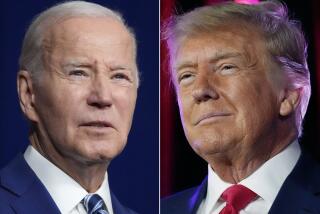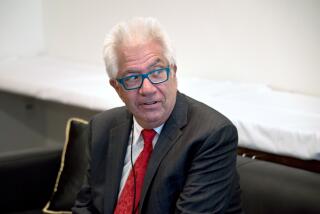Embrace Muslim Moderation
- Share via
America’s ability to relate wisely and well to Islamic societies will be constantly tested this new century. We won’t get far if we think of all of Islam as synonymous with the Taliban, the extremist regime in Afghanistan.
Three recent developments in Muslim societies provide extraordinary examples of new opportunities to reach out to the future. In Iran last week, the surprise win of religious reformers over conservatives could open a window that has been closed to the United States for 20 years. In Indonesia, a Muslim cleric, serving as the nation’s elected president, has beaten back an ominous military challenge, but he will need Western aid and understanding in the months ahead as his new democracy evolves. And in Pakistan, where a non-radical Muslim military coup toppled a corrupt parliamentary government in October, the new leader, Gen. Pervez Musharraf, is openly hoping for a dramatic, unscheduled Clinton stopover during the president’s long-planned visit to India and Bangladesh next month. What Clinton does will be well noted throughout the Islamic world.
U.S.-Iran relations, poisoned by Washington’s Cold War intimacy with the anti-clerical dictatorship of Shah Mohammed Reza Pahlavi, who fell in 1979, could well improve after last week’s historic election. Iranian voters have now empowered clerical reformers while delivering a rebuff to old-line conservatives. This creates a new opportunity for Washington and Tehran to bury old hatchets.
In largely Muslim Indonesia, after decades of corrupt rule, a nascent democracy headed by President Abdurrahman Wahid faces a difficult challenge from the country’s radical Muslims. They appear determined to destabilize the country by inspiring sectarian clashes in alliance with bad elements of the military. If Wahid is to reignite the economy, he will need the help of a loyal army in clamping down on destructive, Muslim-provoked unrest, and he will also need the help of the West in bringing in investment. Otherwise, Wahid will not survive the year; neither, perhaps, will Indonesia’s budding democracy.
The third opportunity for the U.S. comes next month, when, for the first time since 1978, a U.S. president visits South Asia. Despite a mammoth anti-Pakistan public-opinion campaign that originates in India and the U.S. and that is intended to block rational debate on the issue, the Clinton White House is keeping open the highly charged option of a Pakistan stopover. This is the correct position for the president of the United States to take. Indeed, in principle he should make the trip if, in return, Islamabad offers real concessions on points of dispute, including nuclear and terrorist issues, before his arrival.
Among other things, Pakistan should begin putting visible distance between itself and terrorist groups like Harkat Moujahedeen and terrorist figures like Osama bin Laden, all believed to be hiding out in neighboring Afghanistan and thought to be supported by radical Pakistani Muslim groups.
In a recent interview with Hong Kong-based Star TV, Musharraf started in that direction: “We are not a terrorist state,” he said. “My government is against terrorism in any form. Even religion cannot be used for terrorism.”
Musharraf, who has also promised to act responsibly in Pakistan-India relations, professes a firm belief in democracy and a free press and puts out a moderate line on religious issues. Is the general credible, however? The argument against a Clinton visit is that the mere fact of showing up in Islamabad just months after a coup, in a country that barely escapes designation as a supporter of terrorism and pursues nuclearization, would betray American principles. The paradox of such moral correctness--and diplomatic aloofness--is that it will offer comfort to those who would make things worse inside Pakistan and, consequently, undercut those who want to ease the South Asian region back to a zone of stability, not a cauldron of nuclear tension at fever pitch.
Rather than resign itself to human-rights absolutism by refusing to deal with a self-appointed military leader--by no means the worst the U.S. has worked with--Washington would do well to reflect on the wisdom of the great German thinker Max Weber: “It is not true that good can only follow from good and evil only from evil, but that often the opposite is true. Anyone who says this is, indeed, a moral infant.” America’s sometimes infantile relations with Islam would in general benefit from a dose of Weberian sophistication.
*
Times contributing editor Tom Plate’s column runs on Wednesdays. E-mail: tplate@ucla.edu.
More to Read
Sign up for Essential California
The most important California stories and recommendations in your inbox every morning.
You may occasionally receive promotional content from the Los Angeles Times.













